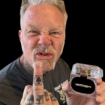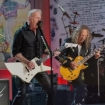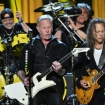Director Joe Berlinger has spent nearly thirty years documenting the turbulent, and often tragic, side of the human condition. He's investigated alleged fratricide in rural New York (in his 1992 debut documentary Brother's Keeper), chronicled the trials of crime boss Whitey Bulger (Whitey: United States of America v. James J. Bulger) and created the revelatory West Memphis 3 doc, Paradise Lost. Heavy music fans will also certainly know the Emmy-winning and Academy Award–nominated filmmaker's fascinating 2004 Metallica documentary, Some Kind of Monster, which pulled back the curtain on the biggest metal act in the world to present a raw, honest portrait of a band in a state of disarray and on the brink of collapse.
But for his latest movie, Extremely Wicked, Shockingly Evil and Vile, the director set his sights on his darkest subject matter yet: serial killer Ted Bundy.
The Bundy biopic (which marks Berlinger's first narrative film since 2000's tepid Book of Shadows: Blair Witch 2, an experience he calls "horrendous"), features Zac Efron in the title role, and tells the story of the relationship between Bundy and his longtime girlfriend Elizabeth Kloepfer, who, slowly but surely, comes to understand that her betrothed partner is indeed an actual monster. Along with Efron, the cast is rounded out by John Malkovich, Haley Joel Osment, Lily Collins, and in one of the most interesting and unexpected cameos of the year, Extremely Wicked features Metallica's James Hetfield in his acting debut as the Utah patrolman who arrested Bundy.
Extremely Wicked, Shockingly Evil and Vile was made concurrently with a Ted Bundy true-crime documentary series for Netflix called Conversations With a Killer: The Ted Bundy Tapes. That project was also helmed by Berlinger, and the research required has made him one of the foremost Bundy experts on the planet.
A few days before Extremely Wicked made its debut at Sundance, we caught up with Berlinger for a chat about what it was like to go deep into the archives on one of the country's most infamous maniacs, the considerations about making a film about a serial murderer of women in the #MeToo era, and how he first groomed Hetfield as an actor at Lars Ulrich's wedding.
SO, OBVIOUSLY YOU'VE PUT JAMES HETFIELD IN THIS MOVIE, AND YOUR RELATIONSHIP GOES BACK TO SOME KIND OF MONSTER. HOW CLOSE ARE YOU GUYS? HOW DID THIS ROLE COME TOGETHER?
I don't want to overstate my relationship with James. We're friendly, James is a very private guy. I would say that I have much more interaction with Lars, and that Lars and I have become very good friends since Some Kind of Monster. And of course the relationship with the band first started back with Paradise Lost.
The prosecution had literally entered lyrics from Metallica songs into evidence to demonstrate that these kids are demonic devil-worshippers. Which is completely absurd because Metallica's music has nothing to do with devil worship. I reached out to the band back in 1995 and I said, "I know you don't license music anywhere, but heavy-metal music is as much on trial as these kids." The band responded and gave us a ton of music to use for the film without charging anything.
After Paradise Lost, we did Some Kind of Monster, which was an accident. It was intended to be just some B-roll I was doing for Lars. This was back when the music industry was still interested in selling CDs, so they wanted some behind-the-scenes footage to put on the back of a CD for their first album in a few years. As we arrived, Jason had quit and they hired the therapist, and because of the relationship established in Paradise Lost, they trusted us. I said to Lars, 'This seems like something we should keep filming,' and he agreed, and the band agreed.
So it's not like James and I hangout and are super buddy-buddy, but I've got a longstanding friendship with the band. The whole reason this came up was that I was at Lars' wedding, so I hung out with James, and he was thinking about doing some voiceover work. I said to him at the wedding that he has such a commanding voice, that I thought that translated into voiceover work and also he would be a really interesting actor because of that presence. This was about four years ago, before I knew I was doing this movie.
So when this movie came along, what inspired me to reach out to him is that when you look at a photograph of officer Bob Hayward, a Utah patrolman who pulled Ted Bundy over when he ran a stop sign in a suburb, Hetfield looked like a better looking, more in-shape version of him. So I had the idea.
The press is making this big deal about "James Hetfield's acting debut" or whatever. But I don't think James has any desire in being an actor. It's not something he mentioned to me, it's something I mentioned to him. "Do you wanna try this? It'd be fun." The role is not huge, but he's in three or four scenes. It's not like I called him up and said, "Hey do you wanna star in this movie and be Ted Bundy." I didn't think he was ready for that, but I think he was ready for this. He spent a couple of days on set, a lot of people in the crew were huge Metallica fans, it was a very fun day.
YOU'VE MADE A TON OF DOCUMENTARIES, BUT IT'S BEEN A MINUTE SINCE YOU LAST DIRECTED A NARRATIVE FILM. WHAT WAS IT ABOUT THIS PROJECT THAT MADE YOU WANT TO DIP YOUR TOE BACK INTO THAT SPACE?
I haven't done a feature film in a while because my first experience with Blair Witch 2 was just horrendous. The studio took my version of the movie that I thought was very good and put it into a meat grinder. I disavowed it before release because it was far from my vision, and that experience of losing control was very painful. I've been sent scripts before in the past and I didn't think they were special enough. They felt like something a lot of people could do, and I wanted something that tapped into my experiences.
This movie gives me a chance to subvert the serial killer genre and turn it on its head a bit. It's not your typical serial killer movie with an escalating body count and the police tracking down the clues as they come upon crime scene after crime scene. This is from the point of view of Bundy's longtime girlfriend who believed he was innocent because Bundy was such a charming, well-liked person and a wonderful boyfriend to this woman. For me, spending a lot of time in the world of true crime and criminal justice, and specifically wrongful convictions … I've had to spend a lot of time evaluating people's claims of innocence and making sure that I believe that they're telling me the truth. I've always wondered if they aren't telling me the truth. Bundy is the classic example of that, he denied his crimes, and unlike many serial killers he claimed he was being wrongfully accused until the last few days of his life before his execution because he thought it would buy him more time. For me, it taps into that phenomenon.
OVER THE PAST YEAR THE #METOO MOVEMENT HAS BROUGHT THE CONVERSATION AROUND SEXUAL HARASSMENT AND ASSAULT INTO THE PUBLIC SPOTLIGHT IN A BIG WAY. DID THAT COME INTO YOUR MIND AT ALL WHEN YOU WERE MAKING THIS MOVIE?
The fact that we're in this #MeToo environment made this script and this story feel even more relevant than it would a few years ago. The rise of serial killing, in many ways ... the Seventies in particular saw this wave of violence against women and I think that's a direct result of the social progress of the Sixties. By the time the Seventies started women were more emancipated, they were traveling individually, they were around in the workforce, and most serial killers are middle-aged white guys. The phenomenon of serial killing, to me, felt like a response to, ironically, the social progress that allowed women to be more present in society. That independence also brought a greater opportunity for men to prey upon women.
WHAT WAS IT LIKE WORKING ON A HARD-NOSED DOCUMENTARY ABOUT TED BUNDY AND A DRAMATIZATION OF TED BUNDY AT THE SAME TIME? DID THAT GIVE YOU A BETTER SENSE OF THE CHARACTER AT ALL?
The documentary started first and a lot of the work was done by the time we were shooting, so on a practical level I was an expert in the subject matter, and was able to give the actors really great archival footage to study their characters. It was very helpful that all the department heads had access to the documentary in terms of authenticity. But it was also liberating. I didn't feel like the movie had to be a blow-by-blow catalog of every killing, because I knew there was another work coming out that would satisfy questions raised by the movie. I could zero in and focus on the aspect of the story that I really wanted to tell in the narrative film — this little sliver of his life, this relationship he had with this woman while all this mayhem was unfolding.












